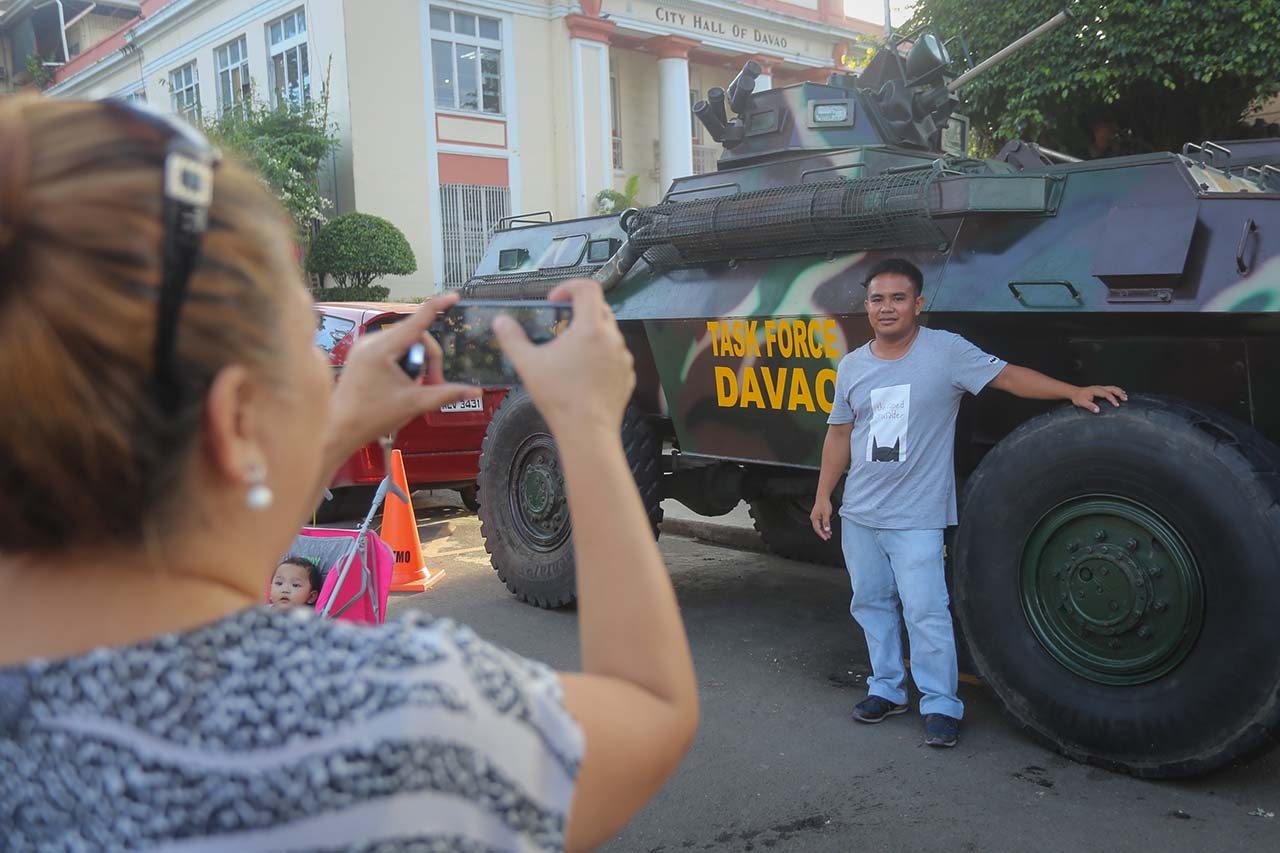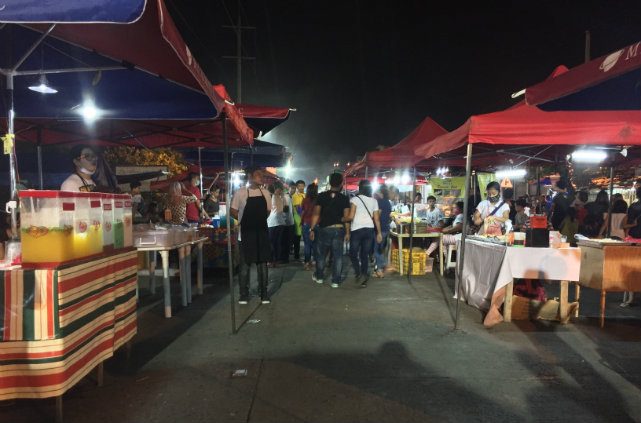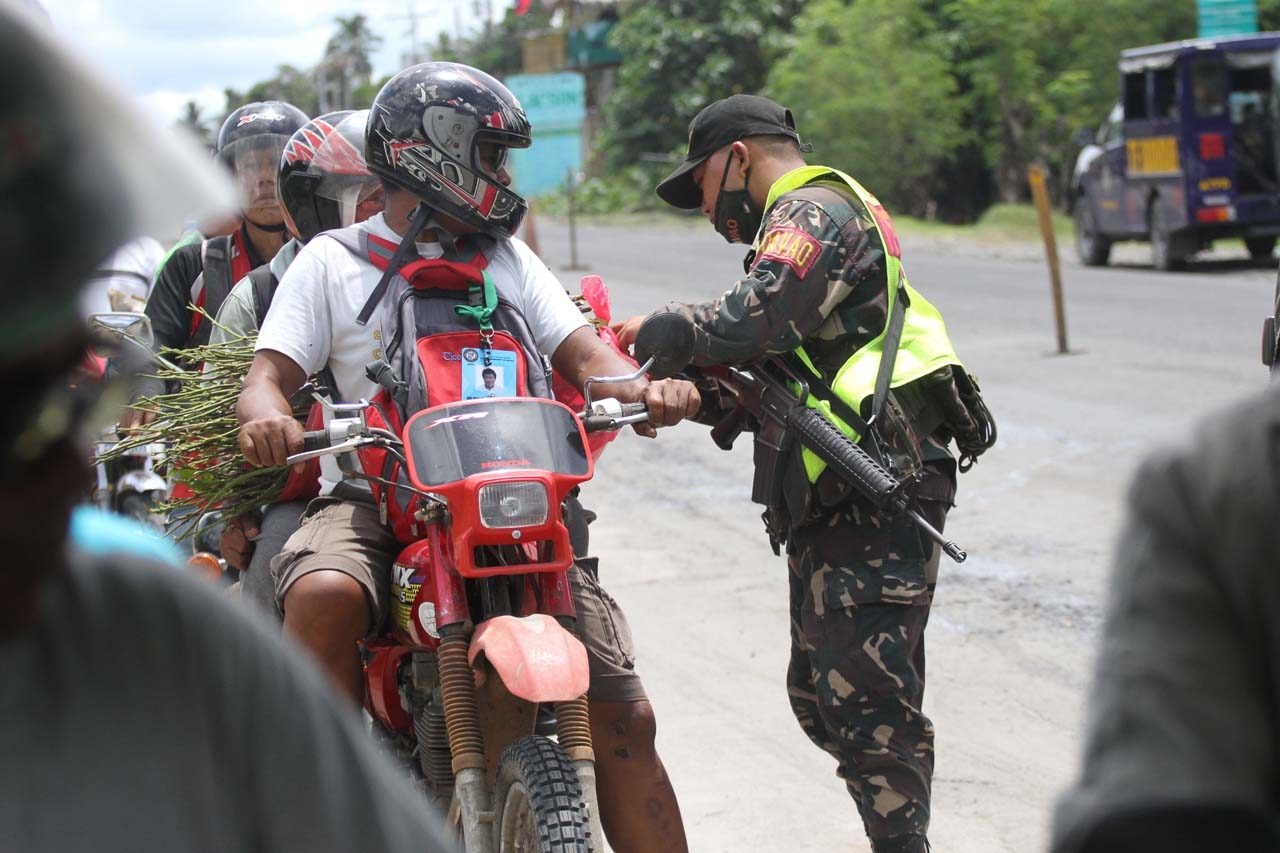SUMMARY
This is AI generated summarization, which may have errors. For context, always refer to the full article.

DAVAO CITY, Philippines – Straight from Russia where he declared martial law in the whole of Mindanao, President Rodrigo Duterte arrived here on May 24 in a maximum state of alert, convening his Cabinet a day after to make sense of the siege of Marawi, which is about 258 kilometers away.
The city that has lived with rebellion and terrorism for decades doesn’t show panic. Davaoeños are a little less apprehensive, more assured. The photo above is proof they can make light of heavy equipment roaming their streets.
“Overall, Davao City is not a stranger to these kinds of things. So mga taga-Davao and yung mga PNP and AFP unit operating in Davao City, medyo alam na, alam na kung ano ang kailangan gawin sa mga ganitong sitwasyon except that nagbago lang ngayon merong martial law,” said Mayor Sara Duterte, eldest daughter of the President.
(Those from Davao and the police and military units operating in Davao City know what to do. They know what needs to be done in these situations. The only thing that’s different is that there’s martial law now.)
It’s just been 8 months, after all, since an improvised explosive device ripped through a night market here, killing 14 people.
“Sukad martial law, gamay na lang tao (Since martial law, fewer people have come here),” said a masseuse at the Roxas night market, the site of the September 2016 blast. He asked new arrivals at the night market: Are you here for a massage? They shook their heads.

Business hasn’t been spectacular for a few months now, he said, especially after the blast and also because the IED was detonated at the masseuse area.
And last week, after the May 23 martial law declaration, business slowed down some more.
Security as crutch
For all the arguments online denouncing or supporting martial law, Davao City does not feel any different. “Mao raman gihapon (It’s the same),” shared one taxi driver as he navigated through the country’s old city center.
“Aw, nidaghan ang checkpoints. Sa sulod ug gawas sa city (Oh, there are more checkpoints. Inside and outside the city),” he added, just before we reached our destination.
At the airport upon arrival, there’s the customary identity check. Random checkpoints move around in the city, flagging most motorbikes and the occasional 4-wheel vehicle.

Armed soldiers, members of Task Force Davao, are visible in strategic areas around the city.
But military and police presence has been the norm here.
“[The people] have been used to it. Parang saklay. O kaya yung security guard. Pag nawala ang security guard, nagpapanic yung mga tao (They’re like a crutch. For example, when people don’t see a security guard, they panic). I think part of that is the populace here in Davao have been so comfortable with them that if they’re not around, not visible, they get so uneasy about it,” explained retired general general Benito de Leon, chief of the city’s Public Safety and Security Command Center.
Residents prefer it this way. “It is the clamor of the populace,” De Leon added, referring to Task Force Davao and the unusual number of armed soldiers in the city.
Since 1981, at least 7 big blasts have rocked the city. The latest, which claimed the lives of at least 14, is believed to have been carried out by terrorists also from Mindanao.
It’s De Leon’s job to improve security in the city after the blast. He said there’s better coordination among security and safety forces and better deployments of their assets overall.
A graduate of the Philippine Military Academy (PMA) Class of 1981, De Leon was a young lieutenant towards the end of the Marcos regime. He downplayed concerns and criticism over martial law.
‘Enjoying fruits’ of martial law
“As opposed to what is being hyped in the other cities, particularly in Metro Manila and outside perhaps the country, which hypes the past abuses of the previous imposition of martial law, you will note, if you go around, that the Davaoeños are enjoying the fruits of martial law,” he said.
The once media-shy general added: “I came out if only to assure the public. Because they are afraid that the martial rule is going to affect [them this way] but I told them that the target of martial law are the bad elements of society. And the focus [is] to protect the good, law-abiding citizens of the country and tourists. So in effect, the heightened security situation under martial law is there to ensure a very safe and secure community. Even if you find a lot of soldiers and policemen in the streets, they are there to secure you. Not to harass you.”
But the wounds of the late dictator Ferdinand Marcos’ military rule are still fresh in the minds of many Filipinos, including Davaoeños.
Davao, after all, was one the first hubs for a Mindanao-grown movement against Marcos’ martial law. And Duterte’s mother, Soledad Roa Duterte, was among its pillars.
In a statement released last Monday, May 29, the Ateneo de Davao University said it supported the President and government troops in their goal to restore peace but “expressed deep concern” about the implementation of martial law.
“With the bishops of Mindanao, we call on our President to orient the military towards a martial law that protects the people and leads to peace. Martial law must respect human rights, for it is ultimately in defense of human rights that it is imposed. Martial law does not suspend the civil and political rights guaranteed by the Constitution,” the university said in a statement.
LGU response
The city was among the first local governments to issue clear warnings and guidelines mere hours after martial law was first declared over Mindanao.
“Exercise prudence in planning your activities,” says the 3rd reminder issued by the city government.
“Religious activities are encouraged to be conducted during daytime. Muslims observing Ramadan are encouraged to hold their activities inside mosques and residences,” reads another.
A “hold and secure” order has been given to soldiers and police, meaning travel to and from the city is allowed but “some movements will still be regulated.”
Marawi is a 5-hour drive away from Davao, but officials are not taking any chances. Vigorous checks on the identities of newcomers to the city is also being “encouraged” by local officials.
“Meron lang kaming suggestion sa mga barangay officials para lang naman na makilala nila yung mga bagong dating. Kasi hindi naman kasi alam, hindi natin alam kung meron bang humalo na ISIS, Maute sympathizers doon sa tinatawag natin na evacuees, mga bagong dating or mga visitors,” Mayor Duterte said on Monday, May 29.
(We have a suggestion for all barangay officials to at least know newcomers in their area. Because you never know maybe ISIS or Maute sympathizers managed to mingle with evacuees, newcomers or visitors.)
During a recent city peace and council meeting, local officials also suggested that newcomers be made to “register” in the barangays they’re moving into.
Mayor Duterte clarified that these were only “permissive instructions” and not mandatory, as they’re not covered by a city ordinance.
“There is freedom to travel so any person can go in and out of any area in the Philippines. That is protected by our Constitution… so the only thing, the most we can do is suggest it to barangay captains but they cannot force really the people to register,” explained the mayor.
Spillover
Radicalization of Muslims in vulnerable communities is a concern not just in Davao City, but in many parts of Mindanao. Without going into specifics, Duterte said a local government unit “close to Davao City” had monitored radicalization attempts.
“These were done by foreign-looking individuals who were accommodated by the imam in a Mosque there, and that person did a lecture in the Mosque,” said Duterte, adding no similar incidents have been monitored in Davao so far.
Days after martial law was declared, Davao police, upon the instructions of the Davao Regional Police chief, launched “Oplan Bulabog” in two barangays (villages) with predominantly Muslim populations.
Police, according to Davao Region director Chief Superintendent Manuel Gaerlan, were instructed to “verify and validate” the residents in those areas.
More than 200 individuals from the two barangays were brought to the Davao City Police Office for further questioning since they did not have identification cards with them and barangay officials were unable to vouch for their identities. They were released the same day.
Gaerlan brushed aside speculations of profiling, particularly against Muslims.
“It is just incidental na maaring (maybe), [the area is] dominated by a particular religion but we do not base our actions on a particular religion, we base them on intelligence reports,” he explained.
The city’s peace and order council also wants an additional battalion of soldiers deployed here.
Mayor Duterte said they’re waiting for the troops’ arrival, but emphasized that “[they] don’t want to be brats about the request” – given the military’s other priorities.
But perhaps they could afford to, this city being the ultimate seat of power. – Rappler.com
Add a comment
How does this make you feel?
There are no comments yet. Add your comment to start the conversation.